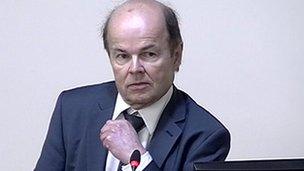Leveson Inquiry: Media vilified me, Christopher Jefferies says
- Published

Mr Jefferies lived above Miss Yeates and her boyfriend in a block of flats
The landlord wrongly arrested over Joanna Yeates's murder has told the inquiry into media ethics that the media had "shamelessly vilified" him.
Christopher Jefferies' statement to the Leveson Inquiry told of a "frenzied campaign to blacken his character".
He said the tabloid press had decided he was guilty of the murder, which happened in Bristol in December 2010.
Some headlines over which Mr Jefferies successfully sued included "The Strange Mr Jefferies".
In other evidence on Monday, ex-Army intelligence officer Ian Hurst told the inquiry his emails had been illegally accessed by a private investigator working for the News of the World (NoW).
Earlier, Robert Jay QC read a statement by Mr Jefferies to the inquiry, which is being held at the Royal Courts of Justice in London.
"The national media shamelessly vilified me. The UK press set about what can only be described as a witch hunt," it said.
"It was clear that the tabloid press had decided that I was guilty of Miss Yeates's murder and seemed determined to persuade the public of my guilt.
"They embarked on a frenzied campaign to blacken my character by publishing a series of very serious allegations about me which were completely untrue.
"Allegations which were a mixture of smear, innuendo and complete fiction."
Former teacher Mr Jefferies described how his reputation was left in tatters after police wrongly arrested him over the murder of landscape architect Miss Yeates.
Dutch engineer Vincent Tabak was convicted of her murder last month.
Miss Yeates, 25, was strangled in her Clifton flat by Tabak, her 33-year-old neighbour, Bristol Crown Court heard.
Her body was found at the roadside on Christmas Day, eight days after she had been reported missing.
Mr Jefferies said he had been "besieged" by the press after his release and had stayed with friends as he had been "very strongly advised" not to go out.
"If it had been apparent where I was staying, those friends would have been besieged by reporters and photographers," he said.
He said he had been "effectively under house arrest" for a period as if he was a "recusant priest at the time of the Reformation going from safe house to safe house".
He also said it had been suggested there was some sort of sexual motive for the murder of Miss Yeates and that he was gay.
'House arrest'
"That created a bit of a problem as far as that line goes," he explained.
"There was another suggestion that I was a bisexual. The press were trying to have it every possible way."
The inquiry heard about a Daily Mirror article headlined "Jo Suspect Is Peeping Tom" and another asking "Was Jo's body hidden next to her flat?".
Ian Hurst secretly filmed the private investigator he claims illegally accessed emails on his computer
Mr Jefferies said the coverage had been "as sensational, as exploitative, as titillating to appeal in every possible way to people's voyeuristic instincts".
Later, former Army intelligence officer Ian Hurst discussed a “óĻó“«Ć½ Panorama programme in which he was shown emails he alleges were hacked from his computer on behalf of the News of the World.
He was told that the paper had employed a private detective, who in turn employed a "specialist hacker" who had worked with Mr Hurst in the intelligence services for three years.
Mr Hurst said his computer had been hacked by a "Trojan horse" - a programme in which harmful code is contained inside apparently harmless data and allows a third party access to email exchanges.
Documents seized in 2007 by the police show the security on his computer had been compromised, but the Metropolitan Police did not tell M Hurst until October 2011.
Mr Hurst said Mr X, who was secretly filmed by the former intelligence officer, told him he had been targeted because of his work in Northern Ireland.
Blogger summoned
Meanwhile, Lord Justice Leveson has summoned political blogger Paul Staines to appear before the inquiry.
Mr Staines, who runs the Order-Order political website under the name Guido Fawkes, supposedly published confidential evidence online.
It included a link to papers submitted to lawyers by former Downing Street communications chief Alastair Campbell. Mr Staines claims to have obtained the papers legally.
Mr Staines is due to give evidence to the inquiry later this week over the documents he published relating to Mr Campbell.
Prime Minister David Cameron set up the Leveson Inquiry in July after it emerged that the NoW had hacked murdered schoolgirl Milly Dowler's phone after she had disappeared. The paper was shut down within weeks.